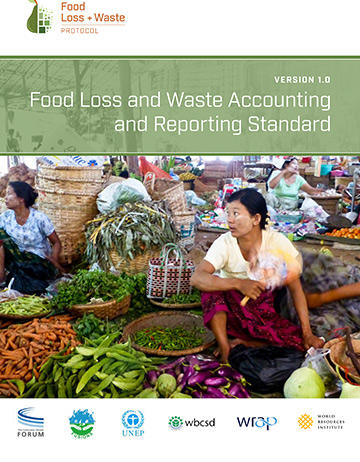
The Food Loss and Waste Accounting and Reporting Standard (or FLW Standard) is a global standard that provides requirements and guidance for quantifying and reporting on the weight of food and/or associated inedible parts removed from the food supply chain—commonly referred to as “food loss and waste” (FLW).
The standard has been developed through the Food Loss and Waste Protocol, a multi-stakeholder partnership convened by World Resources Institute and initiated at the 3GF 2013 Summit. WBCSD is one of the FLW Protocol partners, along The Consumer Goods Forum, Food and Agriculture Organization of the United Nations (FAO), EU-funded FUSIONS project, United Nations Environment Programme (UNEP) and WRAP (The Waste and Resources Action Programme).
The purpose of the FLW Standard is to encourage consistency and transparency in quantifying and reporting on the amount of food and/or associated inedible parts removed from the food supply chain—commonly referred to as “food loss and waste.”
Widespread use of the FLW Standard will motivate and empower countries, companies, and other entities to minimize FLW, thereby realizing economic benefits, enhancing food security, improving natural resource use efficiency, and reducing environmental impacts. This standard enables the consistent measurement of baselines and tracking of progress towards Target 12.3 of the United Nations’ Sustainable Development Goals as well as other targets.
The global standard is designed to be practical so that entities of all kinds can develop an FLW inventory based on their particular quantification goals. Using the clear terminology and requirements provided by the standard ensures international consistency, enables comprehensiveness, facilitates comparability, and supports transparent disclosure of FLW inventories both within and among entities. Quantifying FLW is an important foundation for reduction efforts that can deliver a diverse array of benefits—from reducing costs associated with over-purchase and disposal, to avoiding greenhouse gas emissions, or supporting efforts to eliminate hunger. Entities that prepare inventories in conformance with the FLW Standard will be better informed about how much FLW is generated and where it ends up and therefore better equipped to take action.
The Standard’s Executive Summary is also available in Spanish, Chinese, Japanese and Portuguese.
More information about the FLW Protocol can be found at the dedicated website at www.FLWProtocol.org.

